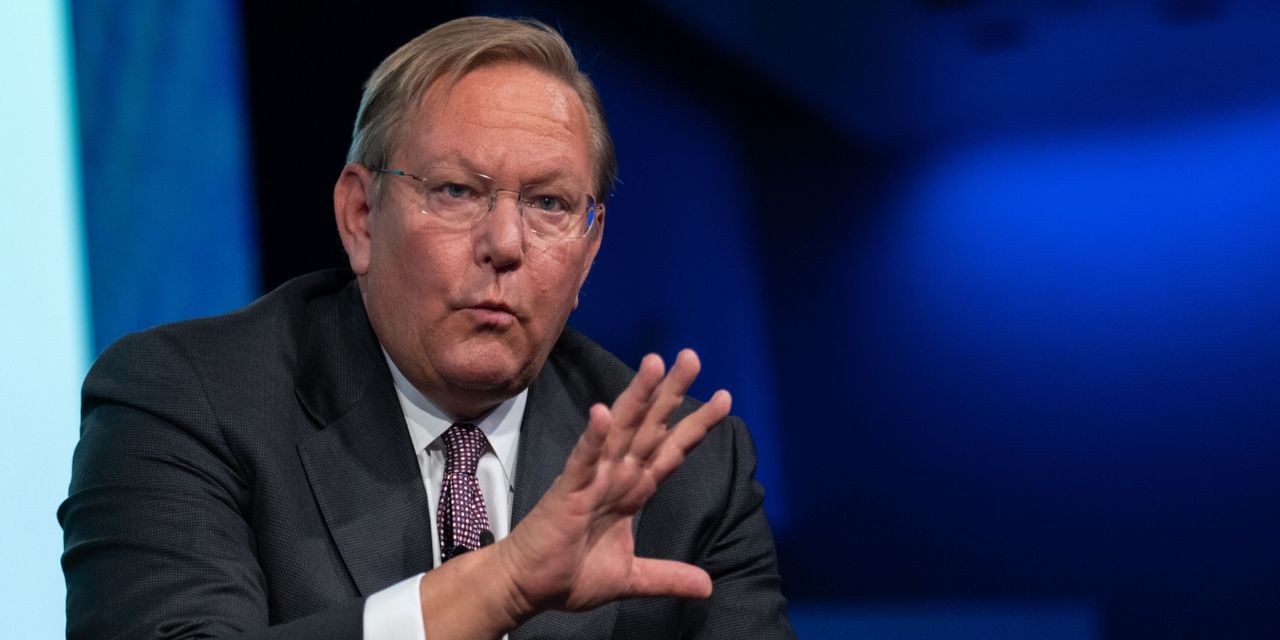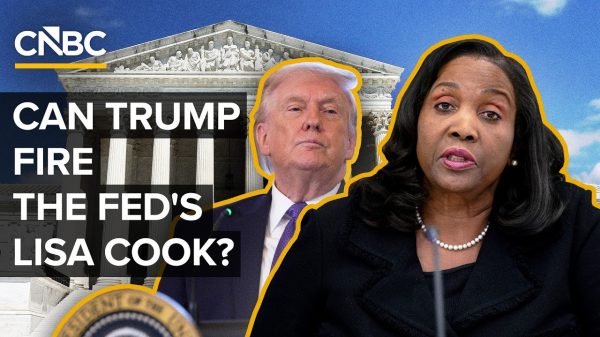While nationalistic zealots around the world—from China to Russia to Turkey to, yes, the U.S.—are setting up trade barriers and decrying globalism, it appears that intrepid business people are paying them no nevermind.
Despite the best efforts by the Our Country First crowd, globe trade is up, up, and away for the most part. This, even with Vladimir Putin’s invasion of Ukraine (and his latest apparent move to block grain shipments from that country), and with the world—especially China—still emerging from Covid doldrums.
It’s a point not lost on David Hunt, CEO of PGIM, the asset management arm of insurance giant
Prudential Financial,
which runs some $1.27 trillion. In an interview with Hunt, I mention that deglobalization seems to be a significant political trend and asked him how seriously he considered it to be.
“We don’t believe that deglobalization either is happening or will happen,” Hunt says. “Actually, global trade flows are very, very strong today. We haven’t really seen a drop in it. And we don’t expect to see one.”
The numbers back Hunt up. According to the United Nations Conference on Trade and Development, or Unctad, global trade hit a record $32 trillion in 2022, up 12.3% from the previous year, which was up 25% from 2020 , which was up 13% from pre-Covid 2019.
See a trend here?
So yes, global trade is humming along—though beneath the surface, there are a number of important trends unfolding. First, it’s true that global trade was weak in the fourth quarter of 2022 and in the first quarter of this year, and that it continues to be a bit tepid. However, that’s more a reflection of fears of a global economic slowdown, which may be abating, and not any concerted—or disparate, for that matter—effort by antiglobalists.
It’s also worth noting that in some countries, electorates have voted out leaders with nationalist leanings. In Brazil, Luiz Inácio Lula da Silva is in as president, and Jair Bolsonaro is out. And of course in the U.S., Joe Biden is in, and Donald Trump is out—though to be sure, while Biden is certainly more of a globalist than Trump, he has maintained and even hardened, particularly in tech, his predecessor’s trade barriers against China. And powerful GOP antiglobalist forces hold sway in Congress.
Speaking of China, though, that country’s standing in the global trade picture is certainly evolving, which Hunt notes.
“What we are seeing with the wave of globalization we have now, and will have in the future, is very different from what we had over the past 20 years, where it was very much a China story,” Hunt says. “Now, what we’re seeing is that it’s a regional story.” Here again, numbers bear Hunt out. US/China trade in goods (imports plus exports) totaled about $220 billion through May of this year, down from last year, and down from 2019 levels, as well—and actually about on par with activity a decade ago. Notably, the decline has been in U.S. imports from China. Our exports to China for the first five months of the year—at $62 billion—powered by recent growth in grain and oilseed shipments, are at a record.
What those numbers are saying is that the meteoric growth of Chinese exports to the U.S. may be over—at least for the time being. And yes, much of that is the result of “conscious uncoupling” (to borrow from Gwyneth Paltrow) or “de-risking”—pick your term of art. Specifically, tariffs and trade barriers, companies reconfiguring their supply chains, and security concerns over Chinese technology and telecom hardware have all contributed to the decline in our imports from China.
No doubt this has crimped the Chinese economy, which may be why we are seeing a renewed appetite by the Chinese for engagement with senior U.S. officials, including Secretary of State Antony Blinken, Treasury Secretary Janet Yellen, U.S. climate envoy John Kerry—and unofficial but significant visits by Bill Gates and 100-year-old former Secretary of State Henry Kissinger. It’s mostly just all talk for now, but China may be realizing that you can’t decouple your way to growth.
Beyond China, though, global trade is taking on myriad new dimensions, Hunt says. “It’s much more fragmented across countries,” he notes. “Whether it’s what’s happening in Indonesia, Vietnam, or Mexico, you’re seeing a lot more regionalization of flows, and much less of a dependency simply on one country. And that fragmentation actually will make this range of globalization more stable and less reliant on any particular country going forward.”
Ian Bremmer, president and founder of Eurasia Group, and a student of global political and economic trends for decades, concurs in an email. “I’d say the difference now is you no longer have the U.S. or anybody else driving the expansion of globalization,” Bremmer says.
“This was a 50-year explosion; you don’t suddenly turn it off,” Bremmer continues. “There are real decouplings going on that are dampening global trade, but they’re either constrained (Russia kicked out of the Group of Seven, U.S. and China in strategic sectors) or incremental (the move to onshoring and near-shoring). And that’s set against existing investments and continued efficiency gains. So, while I can see global trade plateauing, I don’t think we are in an age of deglobalization. At least not yet.”
Unctad data confirm Bremmers take, noting a “reorientation of bilateral trade flows to prioritize countries that share similar political values,” that is, so-called friend-shoring. Examples here are increases in trade between the U.S. and Mexico, the European Union, Canada, and Taiwan (all up about 1%), while Ukraine to Europe has soared 20.5% in 2023’s first quarter versus the first quarter of 2022. On the other hand, on the downside: China to the U.S. and Russia to Europe declined 0.9% and 5.6% respectively.
Hunt’s company, PGIM—pronounced (pea-gym)—is itself a product of globalization. “The business originally grew out of Prudential Financial,” says Hunt. “About 30 years ago, [the investment business] was taken out of the insurance company and set up as a separate operation with the mission to build a big third-party business [and to take money from investors outside the company]. Today, most of our fees come from third-party investors.”
The business took the name PGIM in 2016, Hunt notes. “And it grew out of our efforts to truly globalize the business,” he adds. “In many parts of the world, we can’t use the word ‘Prudential’ because it belongs to Prudential PLC [an unrelated United Kingdom insurer], so PGIM was a name we could use right around the globe to designate the global investment manager.”
PGIM has no plans to pull in its global horns. “We remain deeply committed to our global business model and we continue to invest in the international markets in which we operate,” Hunt tells me. In fact, PGIM’s overseas headcount is up 11% from last year and up 100% from 2018. Today some 31% of its sales and investment professionals are based outside the US.
James Pethokoukis, a senior fellow at American Enterprise Institute, called the antiglobalists’ bluff over a year ago in a piece he wrote titled, “Globalization Is Dead. Long Live Globalization“—and he hasn’t changed his tune. “Despite all the talk about deglobalization, global trade as a share of gross domestic product isn’t far off from its peak at the start of the global financial crisis in 2008,” Pethokoukis tells me. “Even the most obvious crisis point, the U.S. versus China, may not be quite as bad or irreparable as many think. For example, the Biden administration seems to be retreating from its most ambitious restriction on high-tech investments in China. Meanwhile, the rest of the world continues to integrate, such as Britain officially joining an Asia-Pacific trade group. And wait until countries with the worst demographics really start scrambling to attract immigrant workers. Globalization abides.”Sounds like the Dude (from The Big Lebowski) would approve.
So, let the politicians bray. They haven’t killed globalism by any means. At least not yet.
Corrections & amplifications: Global trade hit a record $32 trillion in 2022, according to Unctad. A previous version of this article incorrectly said $32 billion.
Write to Andy Serwer at [email protected]
Read the full article here











